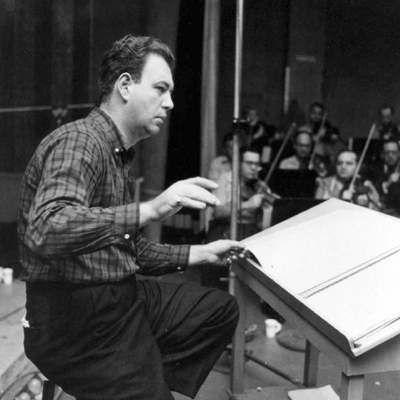NELSON RIDDLE was a great arranger in American pop music history. While he worked with many major pop singers, it was his legendary work with Frank Sinatra on his Capitol concept albums that cemented Dad’s lasting legacy. He was an expert in mood and subtlety and able to draw out the song’s emotional undertext. He was versatile in style, mood, and tempo and packed his charts with rhythmic and melodic variations as well as rich tonal colours that seamlessly blended behind the lead singer’s vocal line. He was a skilled arranger who listened to the strengths and limitations of each vocalist and encouraged them to give emotionally powerful performances. His work with Sinatra is a good example of this. Charles Granata quotes the following from his book “Sessions with Sinatra”: “It quickly became evident that Riddle, out of all the arrangers, had complemented Sinatra better than any other.” Nelson Smock Riddle was born June 1, 1921 in Oradell. He began studying piano as a child and then switched to trombone when he was 14. After leaving the military, he worked as a trombonist for the Tommy Dorsey orchestra, writing several arrangements (“Laura”, and “I Should Care”), until he retired in 1945. With the help of Bob Bain, he was able to secure a job in Los Angeles as an arranger for Bob Crosby at the end of 1946. In 1947, he was promoted to staff arranger at NBC Radio. He continued his studies with Victor Young and Mario Castelnuovo Tedesco on conducting and arranging. He began writing occasionally for Nat King Cole as a ghost-arranger. His arrangements for “Mona Lisa”, 1950, and “Too Young,” 1951 were huge successes. He was soon able to do most of Nat’s music at Capitol Records. Nelson Riddle was now the conductor of the orchestra, and his name was printed on the label. He was no longer anonymously an arranger. Frank Sinatra signed to Capitol Records in 1953. The label encouraged Sinatra to work with Riddle, now Capitol’s chief arranger. Sinatra was reluctant to work with Riddle, even though he had helped Nat get his biggest hit, “Mona Lisa”. However, Sinatra soon came to appreciate the newness of Dad’s approach and began to consider him his most supportive collaborator. They recorded their first song together, “I’ve Got the World on a String”. Sinatra and Dad started to create conceptually unified albums that would have consistent moods. These albums were among the most acclaimed in the history and evolution of popular music. They had a deep mutual respect. In a 1985 KCRW interview, Dad said that he had “opened some doors” which, without his intervention, would have been closed to him. Dad’s 1959 work on the Gershwin Songbook with Ella Fitzgerald was considered one the most beautiful and original interpretations of an incredible body of work. His television and motion picture credits include “The Young at Heart”, “High Society”, “Pal Joey”,” “Paint Your Wagon”,” “The Tender Trap”,” “Can-Can”,” “Li’l Abner”,” “The Great Gatsby”, (for which he was awarded an Academy Award for musical adaptation), and “The Untouchables”, as well as “Route 66”, the very first TV theme to chart. With the continued growth of electronic instruments and rock n’roll, his recording career slowed down in the 1970’s. Linda Ronstadt called him in 1983 to ask him to compose an arrangement for “I Guess I’ll Hang my Tears Out To Dry”. He replied that he wouldn’t consider writing just one arrangement but rather an entire album. This was the birth of “What’s New?”, followed by “Lush Life”, and “For Sentimental Motivs”. These albums were a huge boost for Dad. We would hear him tell us how incredible it was to be “back in the charts” once again. He spoke about their collaboration in a 1985 interview with People Magazine: “She has a strong, beautiful voice. And she’s really amazing power.” God, she can belt out “What’s New” and you believe it. Our father’s final performance was on September 13, 1985 at South Street Seaport. We were his six children, Rosemary Riddle Acerra (Nelson Riddle III), Christopher Riddle, Bettina Belllini, Cecily Finnegan and Maureen Riddle. He died October 6, 1985. We hope that his contribution to the world of music will be remembered by this website, which we have created in his memory. from http://www.nelsonriddlemusic.com
